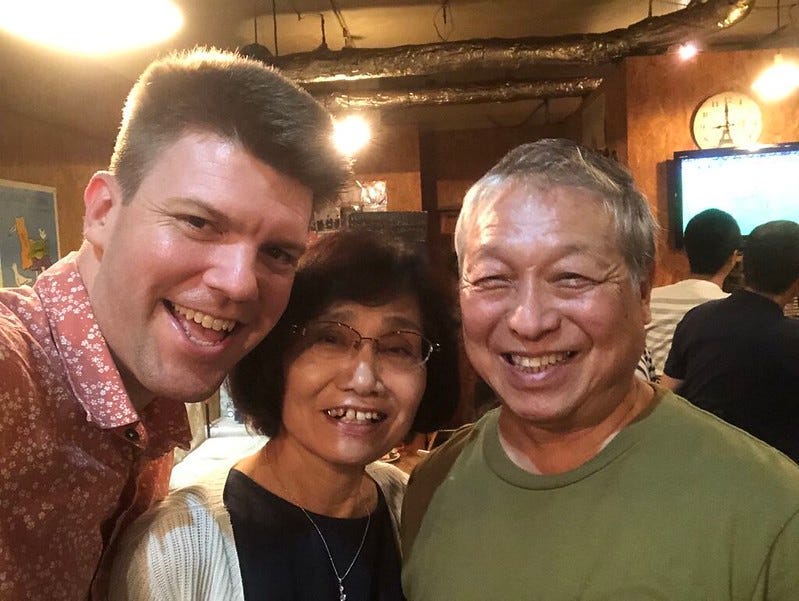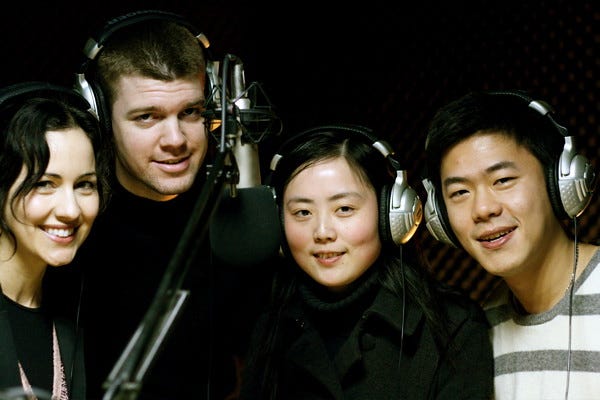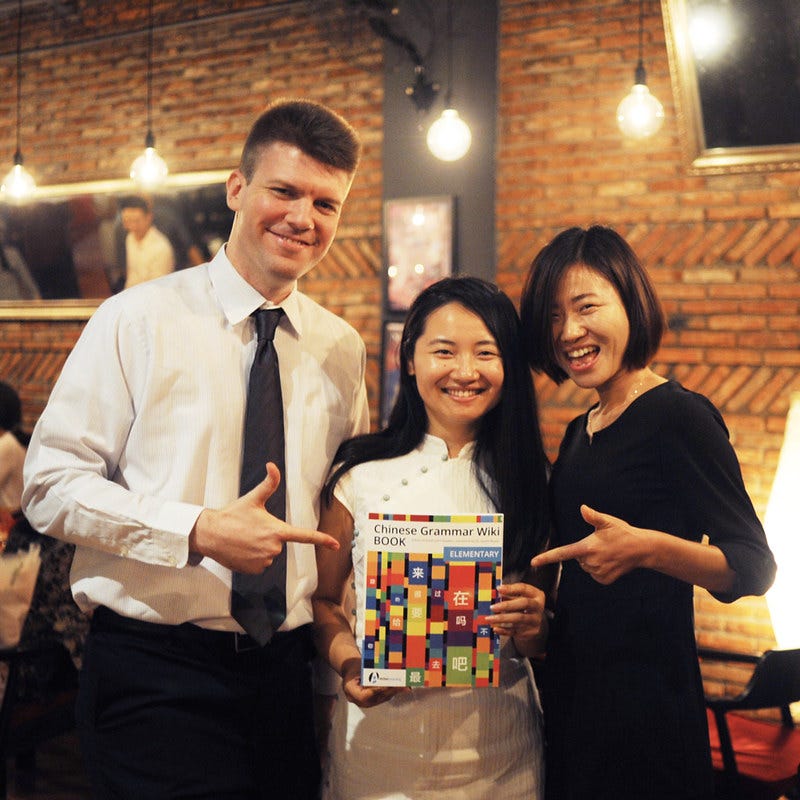ARC Plus: How did we get here? (John)
How John took his sweet time but did eventually find a love for Chinese, and some thoughts about where it all has led
Dear ARC friends,
We’re committed to helping you take your Chinese reading skills from good to great. Whether you're an ambitious intermediate-level learner, or a proud 中國通, we believe you’ll find something useful in our weekly newsletters. And if you subscribe to ARC Plus, we’re confident that you’ll see real, practical gains in both your listening and reading abilities, with weekly dialogues, scripts, and a mini-podcast.
At ARC, we’ve always kept the focus on our carefully chosen excerpts and explanations. But some readers may be wondering, what makes us tick? How did a couple of guys like John and Pete end up sharing their passion for Chinese with thousands of readers around the world?
You’ve heard Pete’s story already, so now it’s my turn. This is John.
My story is quite different from Pete’s in that I grew up in Florida not only monolingual, but also not especially interested in foreign languages.
Both of my parents were well-educated, and both were librarians. Avid readers, they had both me and my two sisters reading at a young age for pleasure. We would frequently ask our parents about new words we encountered while reading, and while sometimes they humored us, as we got older we more often got the reply “look it up.” The three of us got teased at school because the English dictionary seemed to be such a popular book in our home. There were rumors that we even had a “Family Dictionary Night.” (We did not. Who needs a dictionary night when every day is dictionary day?)
And even though both of my parents had studied some Latin and French (and my mom even studied Italian in Rome), it didn’t spill over to us. There was no infectious “passion for languages” (aside from English), and I got the definite impression that neither of my parents were able to attain anything approaching even a basic level of fluency.
So in my own childhood, there was no passion for foreign languages. There was no plan to study them. And if there was a talent for them, I didn’t even know about it. And Asia was a far-off place I never imagined that I’d ever go.
Fast-forward to high school. I got into the IB Program, which was new in Florida. I was required to study a foreign language, and I chose Spanish. It seemed way more useful than French in Florida, and while I enjoyed Spanish and did well in it, it still very much felt like a “school subject” to me and nothing more. After 4 years of IB high school Spanish I could hold conversations on various topics, but I didn’t really want to. (Yes, very sad.)
So when I started at the University of Florida and learned that I needed one more year of foreign language to graduate, I decided I had had enough of Spanish. I wanted something totally different that would be challenging and fun. I was a microbiology major, and I wanted something that could be a total diversion from all the science I had to take. I decided to try an Asian language, and UF offered both Chinese and Japanese. I knew almost nothing about either language, so I did a little research. I learned that Chinese had tones (scary!) and Japanese did not (whew!), so I went with Japanese.
Well it turned out that learning Japanese was weird and wonderful and a lot of fun for me. I loved it. So when I discovered that it was possible to study abroad in Osaka my sophomore year, I totally went for it. It took quite a lot of rearranging to stay on track for my microbiology major, but with all my IB credits, I figured I could make it work. So I went to Japan for my second year of college.
And I absolutely loved it. I stayed in a Japanese homestay, studied Japanese every day, practiced speaking Japanese whenever I wasn’t studying, and was exhausted all the time. It was a wonderful, magical time. I had never felt so alive.
Reuniting with my Japanese homestay parents in 2020.
So by the end of my year abroad in Japan, I was rearranging my studies at UF so that I could become a Japanese major, minoring in (1) English as a second language (so I could teach abroad after university), and (2) Latin American studies (so I could resume my Spanish studies and eventually go live and teach somewhere in South America). Oh, and I also squeezed in three semesters of Mandarin Chinese. Because why not? I was intrigued by Chinese characters and also ashamed that I had been daunted by tones. I was now up for the challenge.
Yeah, I was done with microbiology. Languages and linguistics were my passion. And as early as my third year of college, I was planning to go to China after graduation in the year 2000. Japanese was great, but I was ready for something different again, and China really felt like an adventure.
This is the part where I’ll take a pause, because I’ve taken you, reader, through the story of how I went from a monolingual upbringing to passionate about languages and interested in Chinese in particular.
If you’d love to read all the gory details of how I learned Chinese in China (Hangzhou and Shanghai), you can read these posts on my blog Sinosplice:
John with ChinesePod co-workers c. 2008 (can you believe he can’t find any with him and Pete??)
Part 4 talks about doing a masters in applied linguistics in Chinese 2005-2007, how I worked at ChinesePod 2006-2013 (where I met Pete!), and how I started my own company, AllSet Learning, in 2010. Later I also started Mandarin Companion, and, of course, ARC too!
I’ve now been living in China 25 years. In fact, today, August 20th, 2025, is my 25th Chinaversary. No regrets, and so much gratitude.
Here’s a nice conclusion, quoting from the Part 4 article:
I can’t say I learned Chinese the fastest or to some mind-blowing level, but I achieved my goals and have the skills to apply it in my career. I’ll never stop studying Chinese (“活到老学到老,” as the Chinese say), but especially due to the strong “practice” components of the past 10 [or 15] years, I do feel confident in saying “I’ve learned Chinese.” (Just not all of it!)
What I’ve also learned over the years, by creating lots of different content from Chinese Grammar Wikis to beginner reading books to video courses: I love creating content to help people learn Chinese!
AllSet Learning Chinese Grammar Wiki BOOK launch party, 2017.
And while it seems a bit old-fashioned and maybe even counterintuitive, dialogues are one of the best ways for humans to learn languages. Podcasts are (usually) dialogues, and language textbooks love dialogues too. They work! And they’re simply the best way to connect the topical readings in ARC with real-life interactions in China.
All of this is to say that I am really enjoying creating the ARC Plus materials with Pete and the help of the AllSet Learning team, and I hope you can feel the depth of experience that goes into their creation. I do hope you’re enjoying the material and I’m happy to answer questions as well. 加油, everybody!





Great article! I remember listening to chinesepod upper intermediate back in 2006 or so. Fun times!
I think I may have been one of the first listeners to ChinesePod back in the day! I love how learning Chinese is always a journey,it's so appropriate!